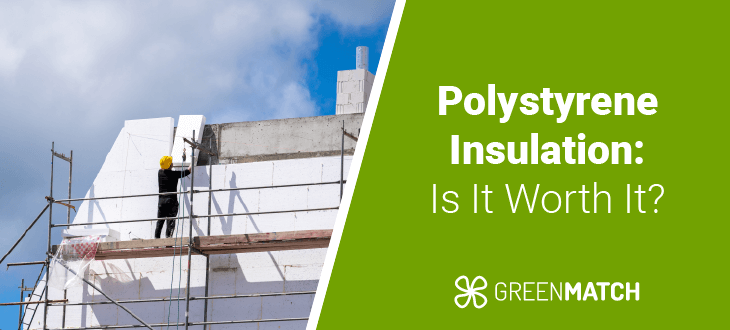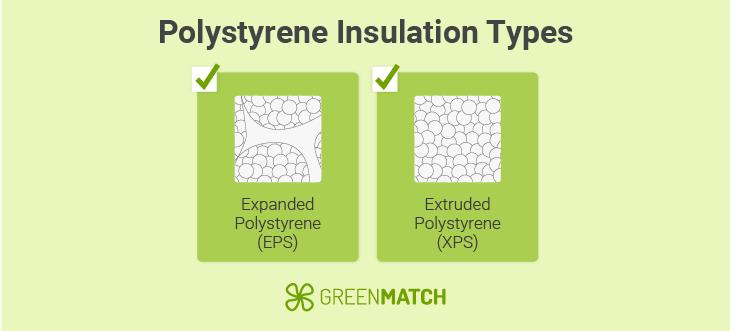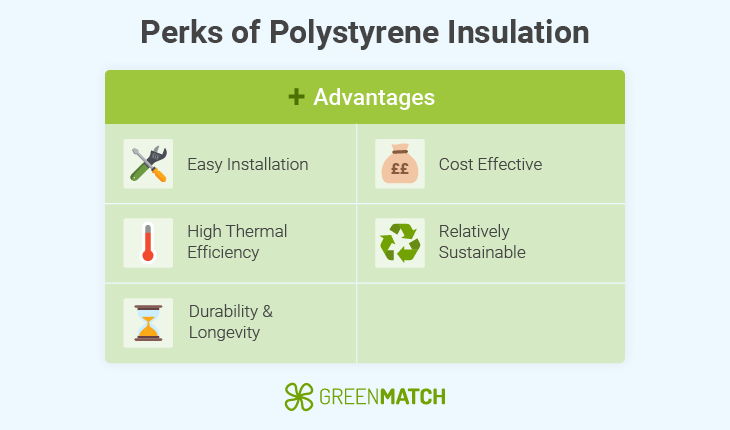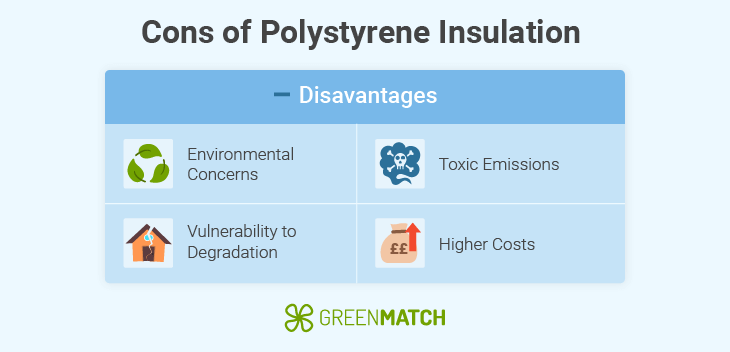Answer these simple questions and we will find you the BEST prices
Which type of solar quotes do you need?
It only takes 30 seconds
100% free with no obligation

Get Free quotes from insulation specialists near you

Save money by comparing quotes and choosing the most competitive offer

The service is 100% free and with no obligation
- GreenMatch
- Insulation
- Insulation Materials
- Is Polystyrene Good?
Is Polystyrene a Good Insulator? UK Guide

- Polystyrene insulation can be found in the form of expanded (EPS) and extruded (XPS) polystyrene, with the latter having a higher density and being less permeable.
- Polystyrene insulation can be injected into cavity walls as beads or as rigid boards used for internal/external walls, floors, and roofs.
- On average, EPS polystyrene costs around £10 per m2, with XPS polystyrene costing a bit more due to its higher density.
Polystyrene is a synthetic polymer that is highly effective at retaining heat. Commonly used as beads or rigid boards, this versatile material also boasts exceptional durability against weathering, moisture, and mould damage, making it a popular option for homes seeking long-term and reliable insulation materials.
However, what does the full picture of polystyrene-based insulation look like? Is polystyrene a good for insulation? This ultimate guide by GreenMatch UK will walk you through everything you need to know, including polystyrene insulation types, pros, cons and regulations.
Ready to insulate your home? Let GreenMatch UK be your one-stop solution for all your needs. Instead of spending endless hours researching and vetting installers online, spend just 30 seconds filling out our online form to receive up to 3 free home-tailored quotes from our network of trusted installers. No charges, no obligations. Just click below to begin!
- Describe your needs
- Get free quotes
- Choose the best offer
It only takes 30 seconds



What is polystyrene insulation?

Polystyrene insulation is a versatile and efficient material that is widely used in home insulation projects to improve energy efficiency and thermal comfort. Due to impressive heat retention and resistance to moisture and mould, it makes for a great long-term solution.
Polystyrene insulation is mainly produced in two forms, expanded polystyrene (EPS) and extruded polystyrene (XPS). Both approaches come with their associated benefits, drawbacks, costs and considerations:
- Expanded polystyrene (EPS): This lightweight, rigid foam material is made from polystyrene beads that are expanded and fused to form rigid boards. Its open-cell structure provides great ventilation for vapour, reducing the risk of moisture ingress. With great versatility, it’s ideal insulation for walls, floors, roofs, and lofts.
- Extruded polystyrene (XPS): This denser rigid foam is produced by extruding molten polystyrene. Its closed-cell structure offers superior moisture resistance and compressive strength compared to EPS, but less porousness for vapour. XPS is commonly used for foundation insulation due to its excellent protection from frost and water damage. It can also be installed under concrete slabs for insulated floors, as well as a durable external wall insulator, particularly in damp conditions.
By understanding the different types of polystyrene insulation and their applications, you can make informed decisions to improve the energy efficiency and comfort of your home.
Is polystyrene good for insulation?
Amongst materials used for insulation, polystyrene stands out as a great choice due to its durability and low thermal conductivity. Polystyrene foam’s structure traps air inside its cells while creating excellent thermal insulation characteristics. This helps to lower heat loss in winter and gain warmth in the summer.
In addition, EPS polystyrene alone delivers an impressive r-value of 2.6 - 3.3 m²K/W, making it one of the more effective materials in resisting heat transfer.
U-value measures a material’s ability to resist heat transfer. A lower U-value indicates better insulation, as it takes longer for heat to pass through the material. Conversely, the R-value represents a material’s thermal resistance. A higher R-value signifies greater resistance to heat flow, making it more effective in maintaining indoor temperatures.
However, as is the case with any insulation material, it’s best to address the advantages and disadvantages thoroughly to make an informed decision.
Advantages of polystyrene insulation

Polystyrene excels at regulating temperature. Its dense cellular structure effectively minimises heat transfer, keeping your space warm in winter and cool in summer. This translates to significant energy savings and reduced reliance on heating and cooling systems.
- Easy installation: Polystyrene insulation boards are lightweight and easy to handle, making installation a breeze. This streamlined process can save you both time and labour costs.
- High thermal efficiency: EPS polystyrene alone exhibits an impressive u-value of 0.030 - 0.038 W/m²K, making it one of the most effective materials in resisting heat transfer.
- Durability and longevity: Polystyrene insulation is renowned for its durability and longevity. It resists moisture, mould, and pests, ensuring long-lasting performance without compromising its insulating properties.
- Cost-effective: While the initial investment may vary, polystyrene insulation's energy-saving benefits often outweigh the upfront costs. By reducing heating and cooling expenses over time, it can prove to be a highly cost-effective choice.
- Relatively sustainable: Polystyrene insulation can be recycled and reused, contributing to sustainable building practices. It also helps reduce carbon emissions by minimising energy consumption.
By considering these advantages, you can make an informed decision about incorporating polystyrene insulation into your building project.
Disadvantages of polystyrene insulation

While polystyrene insulation offers effective thermal performance and durability, it’s just as important to familiarise yourself with several key drawbacks associated with the material. Let’s have a look at some top concerns to look out for:
- Environmental concerns: Derived from fossil fuels, polystyrene production inevitably contributes to carbon emissions. The closed-cell structure of XPS polystyrene also makes it difficult to recycle, often ending up in landfills. Polystyrene also has a relatively high Global Warming Potential (GWP), negatively contributing to climate change.
- Vulnerability to degradation: Particularly with XPS polystyrene, prolonged exposure to sunlight can cause polystyrene to degrade, reducing its insulating properties. This is especially the case when XPS polystyrene is used as external wall insulation.
- Toxic Emissions: Like most synthetic insulation materials, some types of polystyrene may release volatile organic compounds (VOCs) and toxic fumes during manufacturing and installation, which can impact indoor air quality and cause respiratory irritation.
- Higher costs: Polystyrene insulation can be more expensive than some alternative materials, such as mineral wool or cellulose. Home insulation grants available in the UK can help to partially or fully cover such costs.
While polystyrene offers excellent thermal performance and durability to weathering, these drawbacks should be considered when making choices on the insulation material you work with.
When installed professionally and within expected regulations, polystyrene insulation is a safe insulation material to work with. For this reason, it’s highly recommended to work with a professional accredited installer who is well-versed in the methods needed to avoid polystyrene insulation issues.
A great way to ensure you make the most optimal choice for your home is to work with a professional installer. That way, a house assessment can be conducted to determine the best course of action tailored to your needs.
Building regulations for polystyrene insulation
Polystyrene insulation is generally permissible under UK building regulations. However, local construction standards may introduce specific requirements or limitations based on specific circumstances.
To guarantee that your insulation is within compliance, it's best to consult with insulation experts who can provide tailored advice and ensure that all relevant regulations are followed accordingly.
Is polystyrene insulation a good solution for your home?
Is polystyrene a good insulator? When weighing the pros and cons of polystyrene, it emerges as a great solution for home insulation due to its remarkable heat retention and long-term durability. While it may not be the most sustainable material to work with, its ability to outlast most other insulation materials makes it worthwhile insulation for loft, roof, wall, and floor jobs.
Granted, the best way to avoid running into issues with your polystyrene insulation is to work with an accredited professional who can assess your property and tailor the best course of action. Unfortunately, most customers find the endless process of research and vetting to be daunting. That was before GreenMatch UK came along.
With our services, all it takes is 30 seconds to fill out an intake form and receive up to 3 free home-tailored quotes in return. No charges, no obligations. Simply click below to begin, and let the bargains come to you!
- Describe your needs
- Get free quotes
- Choose the best offer
It only takes 30 seconds



FAQ
Polystyrene can be used for a wide range of insulation purposes. EPS polystyrene beads are commonly used as insulation injected into cavity walls, while EPS and XPS insulation boards can fit a wide array of jobs, including floors, internal and external walls, roofs and lofts.
Polystyrene insulation is inherently synthetic, meaning it is not very sustainable to produce, recycle, or repurpose and can release harmful gases during manufacturing and installation. XPS polystyrene is particularly difficult to recycle, often resulting in material ending up in landfills.
Closed-cell XPS polystyrene can function without the need for a vapour barrier on account of its density and lack of porousness, however, with EPS polystyrene it is recommended to install a vapour barrier.
Polystyrene insulation exhibits an impressive thermal retention. EPS polystyrene alone has a u-value rate of 0.030 – 0.038 W/m²K, making it very effective in resisting heat transfer.
Polystyrene-based insulation is highly regarded for its moisture resistance, especially in the case of closed-cell XPS polystyrene. However, it’s important to also account for ventilation to make room for the evaporation of vapour produced within the home.

Akif is a copywriter at GreenMatch since 2023. With a keen interest in community sustainability, green solutions and the role of digital media in identifying climate trends, he aims to hone in on his background in International Studies and Digital Media to provide a multidisciplinary approach to written content rooted in credible research and accuracy.
We strive to connect our customers with the right product and supplier. Would you like to be part of GreenMatch?

